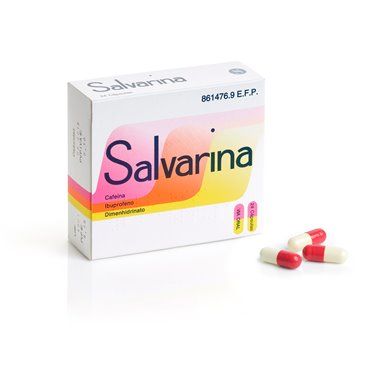Salvarina 24 Capsules
Salvarina is indicated for the relief of pain and discomfort associated with menstruation in adult women and adolescents from 12 years of age.
Salvarina is indicated for the relief of pain and discomfort associated with menstruation in adult women and adolescents from 12 years of age.
Salvarina (24 Capsules)
Caffeine , Dimenhydrinate , Ibuprofen
ACTION AND MECHANISM
Association of analgesic and antihistamine H1 with antiemetic properties. Ibuprofen is a non-steroidal antipyretic and anti-inflammatory derived from propionic acid. It is an inhibitor of the enzyme cyclooxygenase which results in an inhibition of the synthesis of prostaglandins.
INDICATIONS
- [DYSMENORRHEA]: symptomatic treatment.
POSOLOGY
Oral. Adults: initial dose, 1 capsule every 4-6 hours, until the
discomfort disappears. Maximum dose: 6 capsules / day.
CONTRAINDICATIONS
Hypersensitivity to ibuprofen or any of the components of the specialty.
Due to a possible cross-allergic reaction with acetylsalicylic acid or other non-steroidal anti-inflammatory drugs, ibuprofen should not be administered on the following occasions:
- Patients with a previous history of allergic reaction to these drugs [SALICYLATE ALLERGY], [NSAID ALLERGY].
- Patients who suffer or have suffered: [ASTHMA], [RHINITIS] rhinitis, [URTICARIA] urticarias, [POLYPUS] nasal, [ANGIOEDEMA], [PEPTIC ULCER] active and recurrent, risk of [GASTROINTESTINAL HEMORRHAGE], [ULCEROUS COLITIS] , [HEPATIC INSUFFICIENCY] and / or [KIDNEY INSUFFICIENCY] of a serious nature.
PRECAUTIONS
Special warnings and precautions for use:
- In patients at risk or who have manifested gastrointestinal disturbances due to the use of non-steroidal anti-inflammatory drugs, ibuprofen should be administered with caution and under medical supervision.
- [BRONCHIAL SPASM]: It should also be used with caution in patients with a history of bronchospasm resulting from other treatments.
- In elderly patients and in patients with [HEPATIC FAILURE], [KIDNEY FAILURE] and / or [HEART FAILURE], in whom clinical and laboratory parameters should be periodically controlled, especially in the case of prolonged treatment.
- Hypersensitivity: Ibuprofen can cause allergic reactions in patients with allergies to acetylsalicylic acid and other analgesics or non-steroidal anti-inflammatory drugs.
- [EDEMA]: Hydrosaline retention has been observed in some cases after ibuprofen administration, so it should be used with caution in patients with heart failure or [ARTERIAL HYPERTENSION].
- [COAGULATION DISORDERS]: Ibuprofen, like other non-steroidal anti-inflammatory drugs, can prolong bleeding time, so it should be used with caution in patients with blood clotting disorders or on anticoagulant treatment.
- Corticotherapy: In case of previous treatment with corticosteroids, it is recommended to readjust the doses of these gradually if a combination therapy with ibuprofen is established.
- [ASEPTIC MENINGITIS]: Aseptic meningitis has been observed on rare occasions in patients receiving ibuprofen treatment. Although this effect is more likely in patients with [SYSTEMIC LUPUS ERYTHEMATOSUS] and other collagen diseases, it has also been reported in some patients who did not have a chronic disease, so it should be taken into account when administering the drug.
- [CHRONIC ALCOHOLISM]: It should be taken into account that the use of ibuprofen in patients who regularly consume alcohol (three or more alcoholic drinks - beer, wine, liquor ..., a day) can cause gastric bleeding. Possible increase in central depressive effects.
- Although on very rare occasions, ophthalmological alterations have been observed (see adverse reactions). In this case, it is recommended, as a precautionary measure, to interrupt the treatment and perform an ophthalmological examination.
- [NEPHROTOXICITY]: As with other non-steroidal anti-inflammatory drugs, after prolonged treatment with ibuprofen, acute interstitial nephritis with hematuria, dysuria and occasionally nephrotic syndrome have been observed in some cases.
- Ibuprofen should not be taken at the same time as other anti-inflammatory drugs, except under medical supervision.
- NSAIDs can cause an elevation in liver function parameters.
- If the pain persists for more than 5 days (10 days in adults) or the fever lasts more than 3 days, or the pain or fever worsens or other symptoms appear, the clinical situation should be evaluated.
- Driving vehicles: it should be used with caution in patients whose activity requires attention and who have observed drowsiness, vertigo or depression during treatment with this drug.
INTERACTIONS
Although there is no evidence that it can interact with oral anticoagulants, it is recommended to monitor prothrombin time during joint therapy. Central nervous system depressants (alcohol, etc.) can increase the risk of drowsiness.
ADVERSE REACTIONS
The most characteristic adverse effects are:
- Gastrointestinal, nausea, vomiting, dyspepsia, heartburn, dry mouth, feeling of abdominal discomfort, constipation, diarrhea, intestinal micro-injuries, possible ulcer activation and bleeding (melena, hematemesis) can be observed.
- Neurological / psychiatric: Sometimes drowsiness, headaches, confusion, tinnitus and drowsiness may be observed. Rarely, there have been cases of psychotic reactions and depression, as well as some sensation of severe headache, fever, neck stiffness and some drowsiness.
- Ophthalmological: Very rarely, optical reactions, such as blurred vision, decreased visual acuity or changes in color perception after ibuprofen administration, have been observed, which resolve spontaneously.
- Dermatological / allergic: As a hypersensitivity reaction, a skin rash, urticaria and a rash with more or less itching and occasionally fever accompanied by a skin rash, abdominal pain, headaches, nausea and vomiting, signs of liver dysfunction and anaphylactic phenomena have been observed.
Ibuprofen in rare cases can lead to bronchospasm and in any case in predisposed patients.
After prolonged administration and at high doses, ibuprofen can cause alterations of the corpuscular elements of the blood, and hydrosaline retention, with the possible appearance of swelling and edema.
- Anaphylactic or anaphylactoid reactions normally occur in patients with a history of hypersensitivity to acetylsalicylic acid and other non-steroidal anti-inflammatory drugs. This could also happen in patients who have not previously shown hypersensitivity to these drugs.



